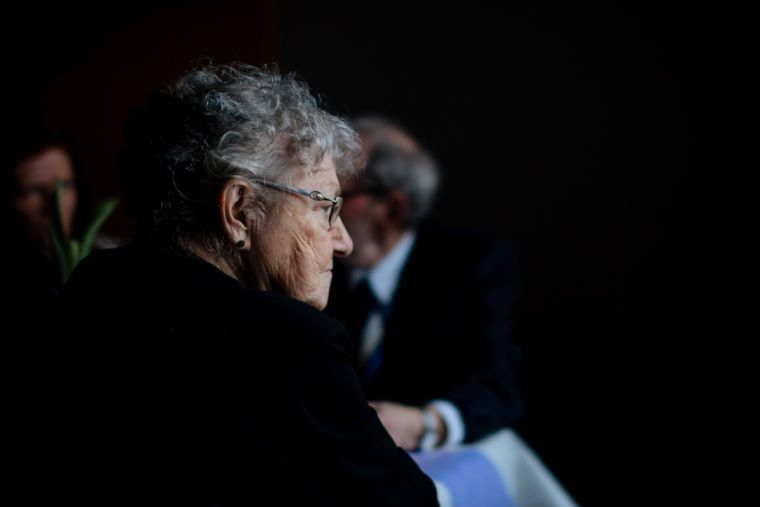Why Alzheimer's isn't the end of everything: Requiem for my friend Pat

When you are a vicar in new in a parish you feel quite vulnerable, well, very vulnerable actually. If it's your first real post, that gets magnified. What are they going to make of me? Is there going to be a revolt? These were the kind of things that went through my head anyway.
Here at St Cuthbert's we'd had the big induction and then the work really got started. There was a great deal to do. Before I'd got to know anyone's name I got to meet Pat and her son Tyrone. They came to church on my first Sunday – and on every Sunday after that.
Pat had severe dementia. But as I got to know Pat, Pat with dementia, someone and something very special emerged. Pat didn't have a lot of words left. But each time she saw me her face would light up and she'd hold my hand.
She would usher people over to see me and then say quite loudly, 'The best vicar in the world!' My goodness, was it humbling. If she wasn't building me up she had a couple of other phrases too – just for me. As she was leaving she'd say – 'See you later alligator.' And knowing that I love cats, 'the cat sat on the mat'. She also used to say, 'You have two daughters, Lucy and Emily.'
That was it in terms of words. But Pat loved to dance to worship music. She liked to join me at the front while I was leading and hold my hand.
Pat was magnificent. Perhaps the greatest encourager I have ever met. And here's the thing. I never knew Pat before she had Alzheimer's. The Pat I knew was the Pat with Alzheimers – and that Pat was beautiful.
As I got settled in I got to know more about the Pat before she got this heartless disease. She had been a school teacher and local people who had been taught by her would come up and say hello. She had been the church photographer. She loved going to New Wine. She had been decorated by the Queen.
But that Pat I never knew. Or at least I never saw.
Pat continued to minister and spread God's love with Alzheimer's.
One of the things I am struck by at memory café here is the extraordinary selfless love of those caring for people with Alzheimer's. It is truly humbling to see husbands and wives caring for their partners through thick and thin.
Tyrone cared for his mum with enormous love and dedication. I don't think I've ever seen a son's love for his mum so beautifully lived out. Tyrone, unconsciously, was teaching our church what sacrificial love looked like. That's something we all need to see and learn and he did it quietly and with great dignity.
Jean Vanier, founder of L'Arche, gives a story about mutuality.
'The wife of a friend who was a wealthy, prosperous business man, developed Alzheimer disease. He decided not to put her in an institution but to care for her at home. He feeds her, gives her a bath and looks after all her everyday needs. Not long ago he confided to me: "I am becoming more human."'
Caring helps us to become fully human, it seems. Or is it that being heartbroken by being with a loved one with Alzheimer's that changes us? It may not always feel like that we are becoming more human as a result of caring for a loved one, especially if our relative has become incontinent and doesn't know who we are any more.
Tyrone tells me that behind the scenes it was really hard dealing with mum's challenging behaviour. You can't airbrush that out. Alzheimer's is going to hurt. He tells me: 'Alzheimer's is different for everyone who gets it. Some become quite serene. But my mum had extreme and physical manifestations of the illness. I wonder if that's because she was such an energetic person before she got the illness.'
Last week I got a call to go to the hospital. Pat's time had nearly come. She just had a few hours to live. It was a chance to hold Pat's hand again. As I left she gave me a beautiful smile.
Unlike the rest of my congregation, I only knew Pat as a person with Alzheimer's. I never saw her as a young mum, or the person who did the coffee bar at church, or a teacher. Pat to me was Pat with Alzheimer's. I am glad I knew her as she was.
Dr Jennifer Bute is an ex-GP who is going through the dementia journey. On her website she points out that there is a tendency when someone has dementia to mourn the person they were. That is natural. But how can we celebrate all that they are with dementia? She points out that it isn't just about what she, or anyone with dementia, used to be.
Even without dementia we all used to be something and someone else. That's the story of the seasons of any life. But with the God who is outside of time, there are always three dimensions. Yesterday, today and tomorrow. God does not see us just as we are now, he sees us in the round, as we were, are and will be.
I have a strong hope that Alzheimer's is not the end of hope. But that doesn't mean it is the end of pain.
Steve Morris is the parish priest of St Cuthbert's North Wembley. Before being a priest he was a writer and ran a brand agency. In the 1980s he tried to become a pop star. Follow him on Twitter @SteveMorris214











